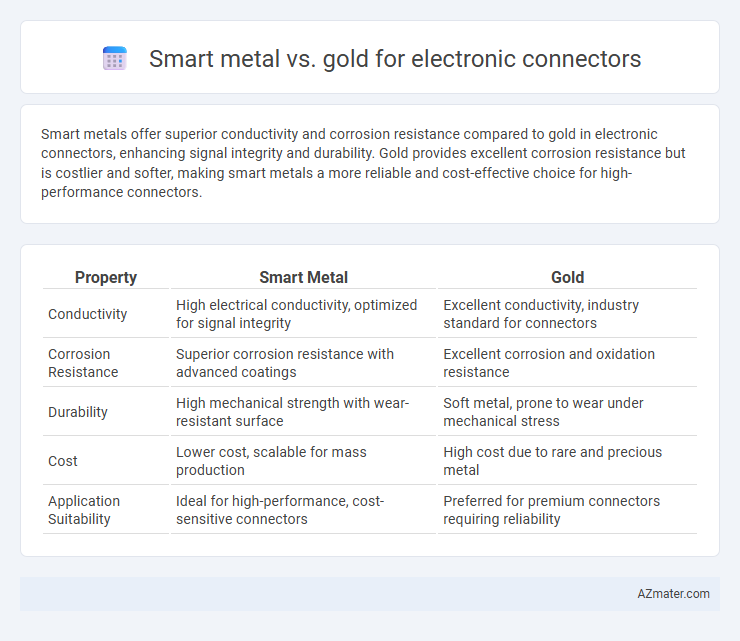Smart metals offer superior conductivity and corrosion resistance compared to gold in electronic connectors, enhancing signal integrity and durability. Gold provides excellent corrosion resistance but is costlier and softer, making smart metals a more reliable and cost-effective choice for high-performance connectors.
Table of Comparison
| Property | Smart Metal | Gold |
|---|---|---|
| Conductivity | High electrical conductivity, optimized for signal integrity | Excellent conductivity, industry standard for connectors |
| Corrosion Resistance | Superior corrosion resistance with advanced coatings | Excellent corrosion and oxidation resistance |
| Durability | High mechanical strength with wear-resistant surface | Soft metal, prone to wear under mechanical stress |
| Cost | Lower cost, scalable for mass production | High cost due to rare and precious metal |
| Application Suitability | Ideal for high-performance, cost-sensitive connectors | Preferred for premium connectors requiring reliability |
Introduction to Electronic Connectors
Electronic connectors, essential for establishing reliable electrical connections, greatly benefit from advances in materials like Smart metal and gold. Smart metal, known for its superior conductivity, corrosion resistance, and cost-effectiveness, provides enhanced durability for high-performance connectors. Gold remains a preferred choice due to its excellent corrosion resistance, low contact resistance, and long-term stability in electronic connectors.
Defining Smart Metal in Electronics
Smart metal in electronics refers to advanced conductive materials engineered with enhanced properties such as high corrosion resistance, excellent conductivity, and self-healing capabilities, making them ideal for reliable electronic connectors. Unlike traditional gold connectors, smart metals often incorporate alloys or coatings that improve durability and reduce costs while maintaining stable electrical performance under various environmental conditions. These innovations enable longer lifespan and improved signal integrity in electronic devices, distinguishing smart metal as a cutting-edge alternative to gold in connector applications.
Gold: The Traditional Standard
Gold remains the traditional standard for electronic connectors due to its exceptional corrosion resistance and excellent electrical conductivity, ensuring reliable signal transmission in critical applications. Its inherent softness allows for better mating and demating cycles without damaging delicate contacts, which is essential for maintaining long-term connector integrity. Despite higher costs compared to smart metals, gold's proven performance and stability in harsh environments make it the preferred choice for high-reliability electronic components.
Key Performance Metrics: Conductivity & Reliability
Smart metals exhibit superior electrical conductivity and enhanced reliability compared to gold, making them ideal for electronic connectors in high-performance applications. Their unique alloy compositions reduce contact resistance and improve resistance to corrosion and wear, ensuring longer lifecycle and consistent signal integrity. While gold remains a benchmark for conductivity and corrosion resistance, smart metals offer cost-effective alternatives with comparable or better performance under demanding operational conditions.
Cost Comparison: Smart Metal vs Gold
Smart metal connectors offer a cost-effective alternative to gold, significantly reducing expenses due to lower raw material and manufacturing costs. While gold provides excellent corrosion resistance and conductivity, its high market price and volatility increase overall connector costs. Choosing smart metal materials can maintain reliable electronic performance while achieving substantial cost savings in mass production scenarios.
Corrosion Resistance and Durability
Smart metal connectors, often composed of advanced alloys like nickel or palladium composites, exhibit superior corrosion resistance compared to traditional gold connectors by forming stable oxide layers that prevent degradation. Gold connectors, while highly conductive and naturally corrosion-resistant due to their inertness, can suffer from mechanical wear and surface damage over prolonged use, reducing durability. The enhanced durability and corrosion resistance of smart metals make them ideal for harsh environmental conditions and high-reliability electronic applications.
Application Suitability: Where Each Metal Excels
Smart metal alloys offer superior electrical conductivity and corrosion resistance, making them ideal for high-performance electronic connectors in harsh environments such as automotive and aerospace applications. Gold's exceptional corrosion resistance and excellent conductivity ensure reliable signal transmission in low-current, precision electronics like medical devices and telecommunications. Smart metals excel in rugged, high-durability conditions, while gold is preferred for applications requiring long-term reliability and minimal signal loss.
Environmental and Sustainability Factors
Smart metal connectors offer superior environmental benefits compared to gold, primarily due to their recyclability and lower extraction impact. Gold mining often involves significant energy consumption and toxic chemicals, contributing to ecological degradation and resource depletion. Incorporating smart metals reduces carbon footprint and aligns with sustainable manufacturing by enabling efficient material recovery and minimizing hazardous waste.
Market Trends and Industry Adoption
Smart metal alloys are rapidly gaining traction in the electronic connector market due to superior conductivity, corrosion resistance, and cost-effectiveness compared to traditional gold plating. Industry adoption of smart metals is accelerating as manufacturers seek durable, lightweight solutions that sustain high performance in demanding environments, driving a gradual shift from gold-based connectors. Market trends indicate an increasing preference for advanced materials like smart metal, fueled by expanding applications in automotive electronics, 5G infrastructure, and consumer devices.
Future Prospects: Evolving Connector Technologies
Smart metal alloys demonstrate significant potential in electronic connectors due to their enhanced conductivity, thermal stability, and corrosion resistance compared to traditional gold plating. Emerging technologies in connector design emphasize lightweight, flexible, and cost-effective materials, positioning smart metals as a sustainable alternative with scalable manufacturing advantages. Innovations in nano-coatings and composite smart metals are driving the future of electronic connectors, ensuring improved performance and longer lifecycle in high-frequency and harsh environment applications.

Infographic: Smart metal vs Gold for Electronic connector
 azmater.com
azmater.com